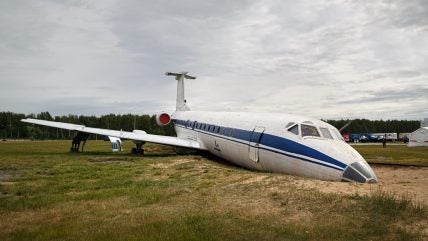
Sanctions, supply chain issues and manufacturing demand for war underpinned Russia’s record number of aircraft incidents in 2023, GlobalData analysts say, contrasting with a decrease in fatalities across the global aviation sector.
There were at least 180 aviation accidents in Russia last year, more than double that of 2022, according to investigations by exiled Russian newspaper Novaya Gazeta. Eleven of these incidents came in the first nine days of December alone.

Discover B2B Marketing That Performs
Combine business intelligence and editorial excellence to reach engaged professionals across 36 leading media platforms.
Russia has been designated with ‘red flag’ status by the International Civil Aviation Organisation (ICAO), marking it as one of the four most dangerous countries to fly in globally along with Liberia, Bhutan and the Democratic Republic of Congo.
“Russia’s entire aviation sector has been redirected to the war industry rather than civil aviation,” says Wilson Jones, aerospace and defence analyst at GlobalData.
Russian aviation accidents rise despite downward global trend
Despite a recent spate of high-profile malfunctions aboard Boeing jets, fatalities in air travel dipped to the second lowest number on record in 2023: 124 deaths aboard commercial jets, according to aviation safety consultants Jacdec.
This compares to 40 in 2017, the lowest on record, and 1,200 in 2000 and 2001, the highest on record.

US Tariffs are shifting - will you react or anticipate?
Don’t let policy changes catch you off guard. Stay proactive with real-time data and expert analysis.
By GlobalDataJones also points to “the possibility of saboteurs in Russia who are doing their part, as we’ve observed with the rail system.”
As the second anniversary of Russia’s invasion of Ukraine nears, anti-war sabotage of Russian planes exists, but the effect of US and EU sanctions is unmistakable.
With Russian operators unable to access spare parts and technical updates for planes made by Western manufacturers, Moscow lodged a complaint with the ICAO on the grounds that they endanger air safety.
“Since Russia can’t buy what it needs from the West like it has since the 90s, it’s going back to building almost everything domestically,” Jones tells Airport Technology.
The impact of the sanctions has also been intensified by the Kremlin’s rigid state control of Russia’s aviation industry.
From President Putin transferring all management rights for Pulkovo Airport in St. Petersburg to sole Russian ownership at the end of 2023, to the 16-month delay in repair for Cubana de Aviación’s Ilyushin jet in Russia, state control has seen stagnant results.
Jones points out that these numbers equate to the “net totals of accidents”, and that it is worth noting that “Russia relies disproportionately more on aviation than other countries”.





